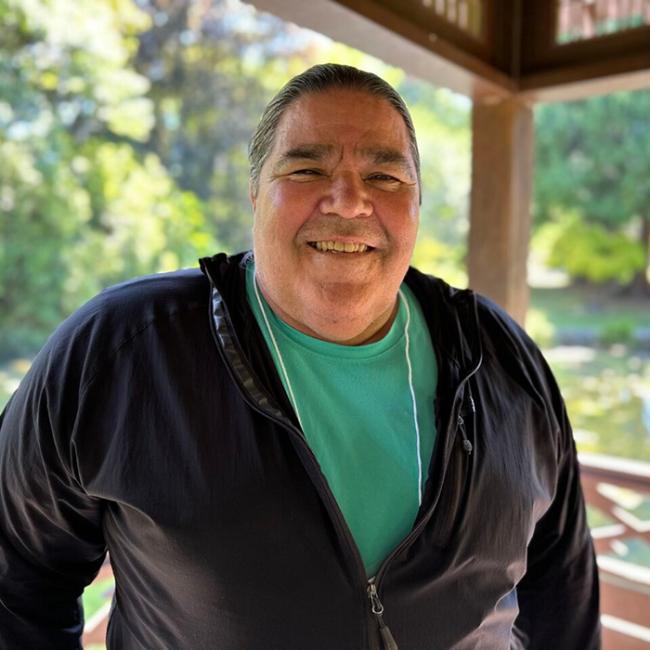Challenge the boundaries of traditional studies and customize your graduate degree.
You see connections others don't. Discover a flexible degree program that lets you study and think across boundaries.
Choose from courses in different academic fields to create a personalized, transdisciplinary education.
Connect your experience and profession with a range of inter-related academic subjects and complete applied research that's relevant to your life and career goals.
Flexible delivery
Design a program that fits your life with online courses and an optional two- or three-week residency.
Customized courses
Combine courses that interest you from other RRU graduate level programs.
Completion options
Choose from one of three completion options: course based, research paper or thesis.
Upcoming offerings
September 08, 2026
Application deadline ℹ
Delivery model
Domestic tuition
International tuition
Related Schedules
January 18, 2027
Application deadline ℹ
Delivery model
Domestic tuition
International tuition
Related Schedules
September 07, 2027
Application deadline ℹ
Delivery model
Domestic tuition
International tuition
Related Schedules
Request more information
Design your own program
This program gives you the flexibility to customize your degree by combining courses from different master’s and graduate certificate programs at Royal Roads.
This means that you can choose from courses across disciplines, led by experts in different academic fields.
Integrate knowledge from your experience and profession with a range of inter-related academic subjects. And complete applied research that's relevant to your life and career goals.
Work with an advisor to build your schedule
Our program advisors will work with you to build a schedule that aligns with your career or research interests. As part of your application, you’ll create a course plan together, which usually takes about a month.
You can design a program and a schedule that fits your life, with online courses and an optional two- or three-week residency.
Since the degree is interdisciplinary, no more than half of your courses can come from any one program.
Completion options
You can choose to complete your program through a course-based, major project or thesis option.
This lets you decide how to showcase your learning: build broad expertise through coursework, create applied solutions with a major project, or contribute new research through a thesis. Learn more.
Ways to build toward this degree
You can apply credits from the Graduate Certificate in Interdisciplinary Studies or Graduate Diploma in Interdisciplinary Studies toward this degree program.
Program length & delivery
You can expect your degree to take two to two and a half years to complete. You can do one on-campus residency with another master's program or you can complete your degree entirely online.
Online learning
Online courses consist of assigned readings, synchronous or asynchronous lectures, interactive discussions, and individual and team assignments.
You’re expected to meet deadlines and contribute meaningfully to your class. Your contributions are a big part of everyone’s learning.
Normally, you’ll take one course at a time. Each online course requires approximately 20 hours of work per week.
Residency
You have the option of taking a blended program, which includes online courses and a two- or three-week residency on campus.
Residencies are intensive and immersive. Many students say this time together is the highlight of their program.
During your residency, you can expect to:
- attend classes full time (e.g., Monday to Friday from 8 a.m. to 5 p.m.)
- complete homework and individual and team assignments outside of class hours
- take part in extracurricular activities
Residencies are offered for program areas such as business, communication and culture, environment and sustainability, humanitarian studies, leadership and tourism.
Courses
Non-credit Required Activities
MAISCON
MAIS Connect
0.0 Credits
Online
ITAI
Introduction to Academic Integrity
0.0 Credits
Online
Credit Required Activities
INDS505
Academic Writing and Critical Thinking Across Disciplines
3.0 Credits
Online
INDS500
Theory in Interdisciplinary Studies
3.0 Credits
Online
INDS510
Social Science Research Methods
3.0 Credits
Online
Options for Completion
You have three options to complete your program:
- Course-Based Option: you complete the 3 program required courses as well as 9 elective courses from a pre-screened selection found below. See our MAIS Program Guide for a more detailed overview.
- Social Science Research: bring in your own research topic with either a research paper or apply for a thesis and add elective courses to complete your program
- Laddering and Transfer Credit Option: when you have completed for-credit graduate courses prior, you may apply to transfer up to 12 credits into the program.
To ensure interdisciplinary breadth of study, you may select up to 5 courses from any one field of study.
Electives from the College of Interdisciplinairy Studies
INDS515
Global Perspectives on Indigenous Ways of Knowing
3.0 Credits
Online
INDS525
2SLGBTQI+ Global Issues and Community Engagement
3.0 Credits
Online
INDS545
Misinformation and Society
3.0 Credits
Online
INDS620
Research Paper
6.0 Credits
Directed, Field, Lab or Major Project
INDS690
Thesis
12.0 Credits
Directed, Field, Lab or Major Project
Business/Management Electives (online)
Please note: some courses may have prerequisites or conditions. For example, another course may be needed before you can take a specific course or we may ask you to send us a copy of your resume for assessment of fit.
BUSA506
Strategy
3.0 Credits
Online
BUSA531
Environment of Management
3.0 Credits
CHMN635
Leading Strategic Systems and Culture Change
3.0 Credits
Online
CHMN675
Organizational Change: Advanced Models, Methodologies and Measurement
3.0 Credits
Online
CSIN550
Foundation of Corporate Social Innovation
3.0 Credits
Online
CSIN562
Design Thinking for Social Innovation
3.0 Credits
Blended
CSIN575
Measuring and Scaling Social Impact
3.0 Credits
Online
DTRN585
Digital Innovation and Disruption
3.0 Credits
Online
DTRN590
Digital Transformation: Artificial Intelligence, Ethics, and Governance
3.0 Credits
Online
DTRN575
Leading Digital Transformation
3.0 Credits
Online
ENVR530
Economics for Decision Making
3.0 Credits
Online
EXMN655
Leading a Global Workforce - A Human Resources Perspective
3.0 Credits
Online
EXMN658
Leading with Emotional Intelligence
3.0 Credits
Online
EXMN668
Management Consulting - Essentials
3.0 Credits
Online
EXMN661
Management Consulting - Best Practices
3.0 Credits
Online
GBLD501
Personal and Theoretical Foundations to Global Leadership
3.0 Credits
Online
GBLD511
Strategic Analysis, Decision Making and Evaluation
3.0 Credits
Online
GBLD521
Community Development in a Global Context
3.0 Credits
On Campus, Online
GBLD522
Managing Difficult Relationships Within and Across Community Dynamics
3.0 Credits
On Campus, Online
GBLD538
Evaluation in a Global Context
3.0 Credits
Online
HUMS652
Adaptive Management for Complex Humanitarian Problems in the 21st Century
3.0 Credits
Online
INED500
Indigenous Economic Development
3.0 Credits
Online
INED525
Developing and Managing Indigenous Enterprises
3.0 Credits
Online
INED550
Strategic Approaches to Indigenous Economic Development
3.0 Credits
Online
MGMT562
International Business Strategy
3.0 Credits
On Campus
MGMT564
International Marketing
3.0 Credits
On Campus
MGMT565
International Accounting Tools for Financial Health
3.0 Credits
On Campus
MGMT566
Ethics, Law, and Corporate Governance
3.0 Credits
On Campus, Online
MGMT570
Leading your Workforce in a Global Context
3.0 Credits
On Campus
PCOM645
Organizational Design, Communication and Knowledge Management
3.0 Credits
Online
PJMN501
Managing Complex Projects
3.0 Credits
On Campus, Online
PJMN502
Project Planning and Scheduling
3.0 Credits
On Campus, Online
ORGD625
Organization Design: Processes for Positive Change
3.0 Credits
Online
ORGD640
Organization Development: Supporting Organizational Health and Vitality
3.0 Credits
Online
TRMN506
Sustainable Tourism Management
3.0 Credits
Online
WINV690
Workplace Innovation: Strategy and Culture
3.0 Credits
Online
Communication/Culture Electives (online)
EECO503
Foundations for Environmental Communication
3.0 Credits
Online
HUMS611
Intercultural Competence
3.0 Credits
Online
HUMS661
Risk and Crisis Communication
3.0 Credits
Online
IICS551
Organizational Communication, Culture, and Development
3.0 Credits
On Campus
IICS560
Global Thought and Communication
3.0 Credits
On Campus
IICS621
Intercultural Communication Competence
3.0 Credits
On Campus, Online
IICS625
Communication for Health and Well-being
3.0 Credits
On Campus, Online
IICS627
Enhancing Communication Creativity and Diversity
3.0 Credits
On Campus
IICS637
Digital Data and Social Media
3.0 Credits
On Campus, Online
INDS525
2SLGBTQI+ Global Issues and Community Engagement
3.0 Credits
Online
PCOM540
Communication, Culture, Media and Technology
3.0 Credits
Online
PCOM640
Communication Policy, Politics and Law
3.0 Credits
Online
PCOM645
Organizational Design, Communication and Knowledge Management
3.0 Credits
Online
PCOM650
Special Topics in Communication
3.0 Credits
Online
Education Electives (online)
(Post-Secondary and Educational Technology)
IDSN520
Instructional Design for Technology-Enhanced Learning
3.0 Credits
Online
IDSN521
Graphic Design for Instructional Designers
3.0 Credits
Online
IDSN522
Project Management for Instructional Designers
3.0 Credits
Online
HEAL520
Global and National Perspectives on Higher Education
3.0 Credits
Online
HEAL530
Leading Educational Change in Higher Education Environments
3.0 Credits
Online
HEAL540
New Models for Institutional Viability
3.0 Credits
Online
HEAL550
Systems Thinking and Strategic Planning in Higher Education
3.0 Credits
Online
HEAL560
Quality, Accountability and Educational Effectiveness
3.0 Credits
Online
HEAL570
Leveraging Technology in Higher Education Environments
3.0 Credits
Online
HEAL580
Enrolment Management: Theory and Practice
3.0 Credits
Online
HEAL585
Strategic Enrolment Planning
3.0 Credits
Online
LRNT523
Foundations of Learning and Technologies
3.0 Credits
Online
LRNT524
Innovation, Design and Learning Environments
3.0 Credits
Online
LRNT525
Leading Change in Digital Learning
3.0 Credits
Online
LRNT526
Inquiry into Contemporary Issues in Learning Technologies
3.0 Credits
Online
LRNT527
Creating Digital Resources
3.0 Credits
Online
LRNT528
Facilitating in Digital Learning Environments
3.0 Credits
Online
Environment/Sustainability Electives (online)
CMDV500
Core Principles of Sustainable Community Development
3.0 Credits
CMDV525
Applied Community Development - Case Studies
3.0 Credits
CMDV550
Sustainable Community Development Collaboratory
3.0 Credits
EECO503
Foundations for Environmental Communication
3.0 Credits
Online
EECO504
Systems Perspectives
3.0 Credits
Online
EECO510
Worldviews, Ethics, and the Environment
3.0 Credits
Online
EECO586
Biosphere and Sustainability: Socio-Ecological Justice
3.0 Credits
Blended, Online
ENVP500
Developing a Sustainability Perspective
3.0 Credits
Online
ENVR505
Ecosystem Science and Management
3.0 Credits
Online
ENVR514
Global Environmental Processes and Current Issues
3.0 Credits
Online
ENVR530
Economics for Decision Making
3.0 Credits
Online
ENVR545
Theories and Stories in Sustainable Development
3.0 Credits
Online
ENVR550
Research and Analysis
3.0 Credits
On Campus, Online
ENVR560
Environmental Accounting and Reporting
3.0 Credits
Online
ENVR571
Legal Aspects of Environmental Management
3.0 Credits
On Campus, Online
ENVR582
Environmental Analysis and Remediation
3.0 Credits
Online
ENVR626
Leadership and Sustainable Development
3.0 Credits
On Campus, Online
ENVR660
Environmental Management Tools
3.0 Credits
Online
HUMS653
Environmental and Resource-Based Conflict Management
3.0 Credits
Online
SPCC614
Science and Impacts of Climate Change
3.0 Credits
Online
SPCC615
Climate Policy and Governance
3.0 Credits
On Campus, Online
SPCC616
Climate Solutions
3.0 Credits
Online
TRMN506
Sustainable Tourism Management
3.0 Credits
Online
Humanitarian Studies Electives (online)
CAMN502
Foundation: Understanding Conflict, Change and Systems in Organizational Contexts
3.0 Credits
Online
CAMN552
Structures: Legal Frameworks and Conflict Engagement
3.0 Credits
Online
CAMN553
Processes: Designing Conflict Management Practice
3.0 Credits
Online
CPWB500
Foundations: Reframing Child Wellbeing in Complex Global Realities
3.0 Credits
Online
CPWB502
Practice: Case Studies on Promoting Children's Wellbeing
3.0 Credits
Online
DEMN502
Foundations in Disaster and Emergency Management
3.0 Credits
Online
DEMN503
Facilitation, Coordination and Decision Making in Multi-Stakeholder Environments
3.0 Credits
Blended, Online
DEMN504
Human Dimensions of Disasters
3.0 Credits
Blended, Online
DEMN552
Hazard and Disaster Risk Management
3.0 Credits
Online
DEMN553
Disaster Response and Sustainable Recovery
3.0 Credits
Online
HUMS611
Intercultural Competence
3.0 Credits
Online
HUMS641
Foundations of Policy and Practice in Humanitarian Action
3.0 Credits
Online
HUMS642
Psychosocial Interventions: Managing Stress, Trauma, and Loss
3.0 Credits
Online
HUMS643
Ethno-political Conflicts in the Canadian Context
3.0 Credits
Online
HUMS651
Case Studies in Humanitarian Action: Advanced Policy and Practice
3.0 Credits
Online
HUMS652
Adaptive Management for Complex Humanitarian Problems in the 21st Century
3.0 Credits
Online
HUMS653
Environmental and Resource-Based Conflict Management
3.0 Credits
Online
HUMS661
Risk and Crisis Communication
3.0 Credits
Online
HUMS672
Public Images of Justice and Fairness
3.0 Credits
Online
HUMS673
Indigenous Perspectives on Humanitarianism
3.0 Credits
Online
JUST502
Foundations in Transdisciplinary Justice
3.0 Credits
Online
JUST505
Case Studies in Transdisciplinary Justice
3.0 Credits
Online
JUST506
Transdisciplinary Approaches to Social Justice
3.0 Credits
Online
Leadership Electives (online)
ENVR626
Leadership and Sustainable Development
3.0 Credits
On Campus, Online
GBLD501
Personal and Theoretical Foundations to Global Leadership
3.0 Credits
Online
GBLD511
Strategic Analysis, Decision Making and Evaluation
3.0 Credits
Online
GBLD520
Navigating Geo-Political Dynamics of Global Communities
3.0 Credits
On Campus, Online
GBLD521
Community Development in a Global Context
3.0 Credits
On Campus, Online
GBLD522
Managing Difficult Relationships Within and Across Community Dynamics
3.0 Credits
On Campus, Online
GBLD538
Evaluation in a Global Context
3.0 Credits
Online
LEAD516
Concepts and Theories of Leadership
3.0 Credits
Online
VBLD514
Leadership, Culture and Sustainability
3.0 Credits
Online
Tourism & Hospitality Electives (online)
IHMN505
Trends and Issues in Hospitality Management
3.0 Credits
Online
IHMN520
Financial Analysis and Decision Making
3.0 Credits
Online
TRMN506
Sustainable Tourism Management
3.0 Credits
Online
TRMN507
Responsible Stewardship: An Examination of Ethics in Tourism
3.0 Credits
Online
TRMN535
Event Management
3.0 Credits
Online
TRMN625
Social Entrepreneurship
3.0 Credits
Online
Foundational Residency
You may select one foundational residency found below as part of your program schedule.
You may select no more than 50 per cent of your courses from any one program to assure interdisciplinary breadth of study.
Change Management Residency
Permission required; co-requisites: CHMN635 & CHMN675 (online courses)
CHMN615
Setting the Foundation for Positive Organizational Change
3.0 Credits
Blended, Online
Corporate Social Innovation Residency
The other two courses (CSIN550 and CSIN575) that make up the Graduate Certificate in Corporate Social Innovation are delivered online. You may take CSIN562 as a standalone course through MAIS.
CSIN562
Design Thinking for Social Innovation
3.0 Credits
Blended
Management and Leadership Residency
The other two courses (PCOM645 and WINV690) that make up the Graduate Certificate in Management and Leadership are delivered online. You may take LEAD580 as a standalone course through MAIS.
LEAD580
Leadership, Community, and Collaboration in a Complex Environment
3.0 Credits
Blended, On Campus
Master of Global Management Residency One
Permission required
MGMT561
Political Geography and International Economics
3.0 Credits
On Campus
Master of Global Management Residency Two
Permission required; this course includes an overseas residency.
MGMT569
International Business Operations and Supply Chain Management
3.0 Credits
On Campus, Online
MGMT582
Managing Change in Global Context
3.0 Credits
On Campus, Online
Organizational Design and Development Residency
Permission required; co-requisites: ORGD625 & ORGD640 (online courses).
ORGD610
Setting the Foundation for Organizational Transformation
3.0 Credits
Blended
Project Management Residency
(Permission required; co-requisites: PJMN501 & PJMN502 (online courses).
PJMN500
The Right Side of Project Management
3.0 Credits
Blended, On Campus, Online
Environmental Education and Communication Residency
EECO500
Deepening Ecological Awareness and Understanding
3.0 Credits
Blended
EECO503
Foundations for Environmental Communication
3.0 Credits
Online
Conflict Analysis and Management Residency
CAMN503
Professional Skills: Dealing with Conflict
3.0 Credits
Blended
CAMN504
Reflective Practice: Leading Change in Organizational Settings
3.0 Credits
Blended
Disaster and Emergency Management Residency
DEMN503
Facilitation, Coordination and Decision Making in Multi-Stakeholder Environments
3.0 Credits
Blended, Online
DEMN504
Human Dimensions of Disasters
3.0 Credits
Blended, Online
Justice Studies Residency
JUST503
Current Issues in Justice
3.0 Credits
Blended
JUST504
Indigeneity and Justice
3.0 Credits
Blended
Transforming Child Protection to Wellbeing Residency
CPWB504
Tools and Approaches for Change: Engaged Changemaking with Children, Youth, Families, Communities, and Nations
3.0 Credits
Blended
Global Leadership Residency
GBLD505
Personal Capacities for Working in Complex Global Systems
9.0 Credits
Blended, On Campus, Online
Values-Based Leadership Residency
VBLD510
Values-Based Leadership: Being Best for the World
3.0 Credits
Blended
VBLD512
Values-Based Collaboration and Partnerships
3.0 Credits
Blended
Advanced Residency Courses
Each of these courses includes an on-campus component of study. Taking an advanced residency course does not count as your one residency option for the MAIS program. In other words, you may take one or more advanced residency courses in addition to one foundational residency.
You may select no more than 50 per cent of your courses from any one program to assure interdisciplinary breadth of study.
PCOM530
Strategic Digital Communication
3.0 Credits
Blended, Online
PCOM632
Conflict Analysis and Management
3.0 Credits
Blended, Online
PCOM633
Strategic Communication
3.0 Credits
Blended, Online
PCOM635
Communication for Development and Social Change
3.0 Credits
On Campus
PCOM645
Organizational Design, Communication and Knowledge Management
3.0 Credits
Online
HUMS662
Professional Practice in Conflict and Change Management
3.0 Credits
Blended
Faculty

Professor

Associate professor

Associate faculty

Associate faculty

Associate faculty

Associate faculty

Associate faculty

Associate faculty
Transfer agreements
Refine results
Standard admission
- Completion of a four-year (or comparable) undergraduate degree from a recognized post-secondary institution, with a minimum GPA of 'B+' (3.33/4.33).
- Normally, a minimum of three years of professional experience.
Flexible admission
While an undergraduate degree in a relevant field of study is recommended, applicants may be assessed for admission on the basis of their skills, knowledge and background developed outside traditional learning structures. This flexible admissions approach opens doors to higher learning for qualified candidates who otherwise might not meet traditional admission requirements, and thereby serves the needs of a diverse group of students.
English language proficiency
If English is not your primary language, please review our English language requirements.
Additional recommendations
Ideal candidates are self-directed and highly motivated and possess strong interpersonal, research, and communication skills. MA in Interdisciplinary Studies (MAIS) students move between cohorts and need to be comfortable with completing an individualized program at their own pace while integrating into student teams from different programs.
At a minimum, all applications must contain the following:
Application form
In order to apply online, you will be required to create a log-in account using your email address. You will be required to list all credit courses and/or programs you have completed or are currently enrolled in. An application fee will be required. If your application fees are being paid by a third party, review sponsored student information. Once submitted, you may check the status of your application at any time.
Missed your application deadline? While we can’t make any guarantees, we may be able to accommodate late applications if there's still space and enough time to process. If you're interested in an intake that is now closed to applications, apply for the next available intake and email Admissions with your preferred start date. Make sure you’re prepared to submit your program's required documents right away. We can't make an admissions decision without them.
Official transcripts
Applicants are responsible for arranging for the submission of official transcripts from ALL post-secondary (higher education) institutions currently or previously attended, for all credit courses and/or programs. Transcripts are not required for non-credit programs or courses, though some programs may require proof of professional certifications or designations.
Transcripts are considered official only if submitted directly by the Registrar or other recognized authority of the providing institution in the institution's original, sealed envelope. If the envelope has been opened, the transcripts are no longer official and new (official) transcripts will be required to complete your application.
All international transcripts or credentials are subject to an international transcript and/or credential evaluation.
Personal statement
Your personal statement should be a maximum of two pages and address the areas outlined below. Applicants are encouraged to organize their statements using the following headings to ensure that all topics are clearly addressed.
- Educational and career goals (In this section, you should speak to the role the degree would play in your professional development, and why you are seeking entrance to the program at this time)
- Pursuing a Master of Arts in Interdisciplinary Studies (In this section, you should discuss why your career goals require courses from multiple academic program areas)
- Academic courses and/or training (In this section, you should provide information on courses and/or training you have taken that would provide a foundation for your master’s studies)
- Work and educational history (In this section, you should provide evidence of flexibility in responding to new situations, self-direction, and self-motivation)
- Motivation for seeking entrance to MAIS (In this section, you should discuss what you hope to learn, why RRU, your unique strengths, and any other information you believe relevant)
The MA in Interdisciplinary Studies requires a high degree of flexibility and self-direction from students. We will assess your potential fit for the program in part on the content provided in your personal statement.
Detailed résumé
A detailed résumé is one that provides a comprehensive profile of the applicant. It should include education, work experience (including voluntary/unpaid), reports and publications, professional memberships and affiliations, and other relevant information.
Letters of reference
Your application requires two letters of reference. These letters could be from either a current or past employer, or someone who has known you in an academic or volunteer setting. One of the reference letters could be a personal character reference; however, the emphasis will be placed on professional and academic reference letters.
- Professional reference: This letter should attest to your current or previous performance in your professional life. The letter can address areas such as communication skills, interpersonal and leadership skills, management potential, work ethic, etc.
- Academic reference: This letter should attest to the applicant’s performance in the context of their current or previous studies. The letter can address such areas as academic achievement, study skills, teamwork, leadership potential, flexibility, communication, and technical skills.
- Personal character reference: A personal character reference should consist of a letter from someone who has known the applicant for several years such as a friend, coach, or mentor, etc. The writer must indicate the length of time and context in which they have known the applicant, and consider the following attributes in the letter: compassion; empathy; integrity; equal concern and respect for others; initiative; adaptability; maturity; responsibility; continuity and perseverance. References will not be accepted from members of your family.
Proposed program schedule
After submitting an application online, applicants will be contacted by the College of Interdisciplinary Studies to design a program schedule that includes courses to be taken as part of the program. The development time for an individualized program schedule can vary, however, applicants can expect it will take approximately one month. An application is not considered complete and will not be assessed until it contains a program schedule endorsed by the applicant and the College of Interdisciplinary Studies. Applicants will need to submit their endorsed program schedule as part of their application.
If applicable:
- Applicants declaring permanent resident or Convention Refugee status in Canada must submit a copy of their Permanent Resident Card (PR card) along with their application.
- Transcript evaluation fee or credential evaluation report, if submitting international transcripts.
- An official English language proficiency score report or other evidence of proficiency if English is not your primary language.
For information on how and where to send your supporting documents, please refer to the document submission guidelines.
Admission timelines
As a personalized course schedule is required as part of the assessment process, usual turn-around times do not apply to applications for the MA in Interdisciplinary Studies. Therefore, it is strongly recommended that applicants apply early and begin working with the College of Interdisciplinary Studies as soon as possible to finalize a course schedule.
Curriculum questions
Please contact us with any questions you may have about the curriculum for the MA in Interdisciplinary Studies.
Financial aid and awards
Refine results
Program completion options
Choose from three completion options for the Master of Arts in Interdisciplinary Studies.
A major project or thesis allows you to explore an applied or academic research question that relates to an interdisciplinary or transdisciplinary field of study.
Course-based
You'll complete 36 credits of on-campus or online courses, including the following:
- 9 credits from three required courses in academic writing and critical thinking, interdisciplinary theory and methods
- 27 credits from courses in master's or graduate certificate programs
The coursework option allows you to acquire a maximum breadth of knowledge across disciplines without developing or demonstrating the ability to conduct research. If you struggle with self-directed learning, the regular assignments, deliverables and group work offered in this completion option may help you.
Research paper
You'll complete 36 credits of on-campus or online courses, including the following:
- 9 credits in three required courses in academic writing and critical thinking, interdisciplinary theory and methods
- 21 credits from courses in master's or graduate certificate programs
- 6 credits dedicated to a research paper that aligns with your professional field
The research paper is an independent, interdisciplinary, and applied project that constitutes of an examination of a topic chosen by you and agreed upon by your instructor. You will determine your research goals and develop a research question to guide your work. You will not engage in primary data collection but you may use existing, publicly available data; conduct a theoretical analysis; create a literature review; or pursue a policy analysis. Some, but not all, research-related learning outcomes of the program will be demonstrated in the research paper. Your instructor will provide advice and supervision.
This option is ideal if you want to use your interdisciplinary learning in your workplace or to leverage your research project for consulting.
Thesis
You'll complete 36 credits of on-campus or online courses, including the following:
- 9 credits in three required courses in academic writing and critical thinking, interdisciplinary theory and methods
- 15 credits from courses in master's or graduate certificate programs
- 12 credits dedicated to a master’s thesis
A thesis is a systematic study of a significant problem, issue or phenomenon. The thesis demonstrates your ability to analyze existing research, collate or collect data and apply it to an existing problem, issue or opportunity. The result is a synthesis of theoretical and empirical information, and recommendations for further action.
Requirements for a thesis completion include the following:
- submission for publication in Royal Roads University's digital archive, Pro-Quest and library, and Archives Canada, unless an exemption has been granted
- PDF summary with a minimum of 2,500 words for theses in non-traditional formats
- oversight by a thesis committee, including a supervisor, who is qualified at the doctoral level and demonstrates relevant competency in content and methodology
- public defence and review by an external academic examiner
- approximately 400 hours of effort




